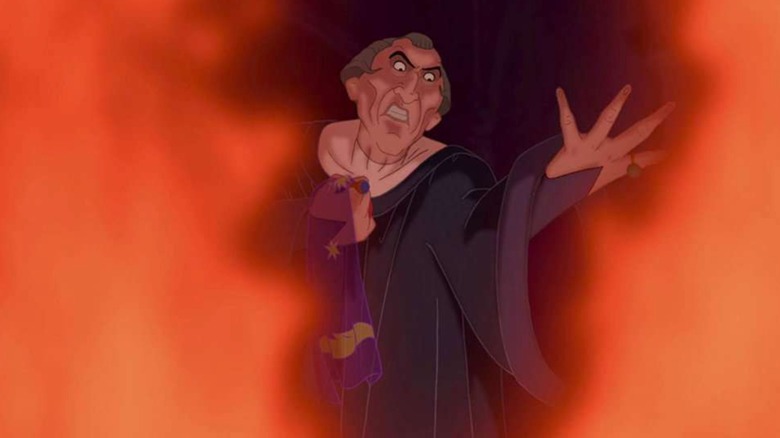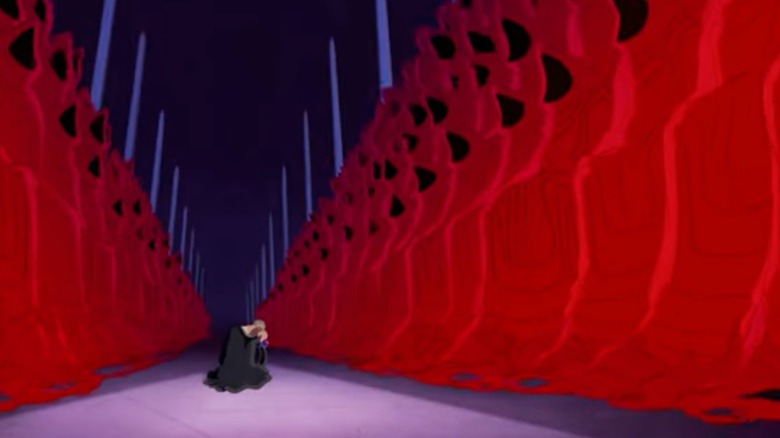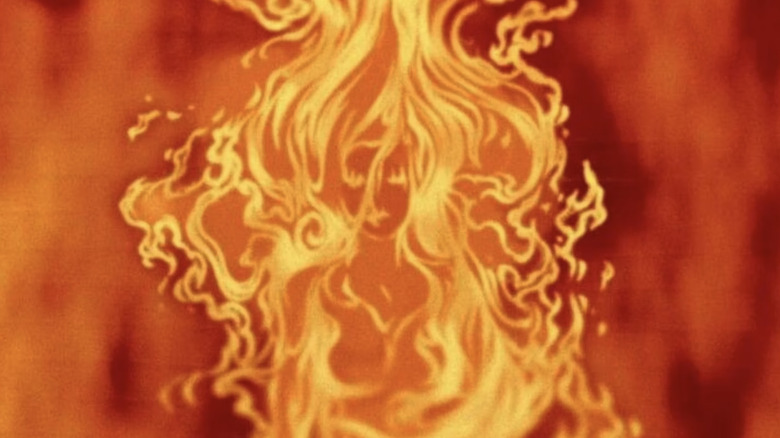The Best Disney Villain Song Could Have Been Even Darker
What's the best Disney villain song? I love Scar's (Jeremy Irons, with fill-in from Jim Cummings) devious rallying call "Be Prepared" from "The Lion King." For the feminine villains, "Mother Knows Best" from "Tangled" (sung by Tony winner Donna Murphy as Gothel) is deliciously theatrical.
Ultimately, still, the crown can't go anywhere but to "Hellfire" from "The Hunchback of Notre Dame," as Claude Frollo (the late Tony Jay) sings before a searing fireplace about his lust for Romani "witch" Esmeralda (Demi Moore). Jay's mellifluous baritone was like no other — the actor's voice was so powerful it lifted the song with its echoes.
Now, the "Hunchback" soundtrack is nothing to sneer at, but "Hellfire" is on another level of daring ambition. "Out There" (by Tom Hulce as Quasimodo) is the "yearning song" seen in many a Disney movie, a la "Part of Your World" from "The Little Mermaid" or "Belle's Reprise" from "Beauty and the Beast." Esmeralda's "God Help the Outcasts" (Heidi Mollenhauer subbing in for Moore) plays with Christian themes you don't see in other Disney movies. Though it indicts the materialistic corruption of the Church, it doesn't play with fire as brazenly as Frollo's song, where a man of God is besieged with lust.
"Hellfire" didn't spark fully formed; the 2021 rerelease of the "Hunchback of Notre Dame" soundtrack included a demo version. ("Hunchback" composer Alan Menken released this on his YouTube channel).
The structure and rhythm of the song are already there, down to the choir chanting as Frollo's backup singing. This early version of "Hellfire" begins ("Beata Maria, you know I am a righteous man...") and ends ("God have mercy on her ... God have mercy on me ... but she will be mine or she will burn!"), the same as the final version. Lyricist Stephen Schwartz's work was incomplete, though.
The fear of Hellfire
Many argue (and I agree) that Frollo is the best Disney villain because he's the most real. Genocidal tyrants? Religious zealots? Sexually abusive authority figures? Those all have and continue to exist. His motive to possess Esmeralda is more devious and personal too; he's only a cartoon villain in the most literal sense.
Like many wicked moralists, Frollo still believes himself to be a holy man (even though Disney capitulated to pressure to turn him into a judge, not a priest like in Victor Hugo's original novel). In the film's opening, he spares Quasimodo because he's warned the eyes of God are watching and he fears eternal damnation. That same fear rouses in "Hellfire," hence the following plea as his desire for Esmeralda consumes him — "Protect me, Maria, don't let this siren cast her spell!" The prayer "Ave Maria" ("Hail Mary") is a treasured chant in Catholicism (it is the core of the Rosary) and it includes a plea for the Mother of God to "pray for us sinners." Even in his terror, Frollo clings to his faith.
Not in the demo version of "Hellfire," though; Frollo instead declares, "I curse you, Maria! And all your saints so cold and cruel, who let this fire consume my flesh and bone!" Yes, Frollo is so prideful he believes himself purer than she who was conceived without sin. This lyrical change also makes his faith seem hollower, useful to hurt others but discarded when it indicts him.
Many of the demo's differences follow from this lyric, with Frollo continuing, "I curse Esmeralda, that name which means a fiery jewel! She is a jewel and one that I must own!" This is a more lascivious declaration than anything in the final rendition of "Hellfire."
Which Hellfire burns brighter?
Is the demo version of "Hellfire" better, or did Menken, Schwartz, and co. make the right call refining it for the final version? Frollo cursing the Virgin Mary for letting Esmeralda tempt him, rather than asking for her help, flows better from the preceding line ("It's not my fault if in God's plan he made the Devil so much stronger than a man!"), which is the same in both versions. Frollo spitting spite at the forces of Heaven continues his desperation to be blameless.
I think the demo version is less complex than the final, though. Frollo doesn't feel as conflicted and fearful, merely angry and prideful. His going from blaming God to prostrating before the Virgin Mary isn't contradictory, it just reflects the swell of conflicting emotions blazing in his darkened soul.
Many of the other lyrical changes are for the better too. Part of the chorus is Frollo shouting the word "Hellfire!" over and over, which the final version wisely trims. "Hellfire! What is this hellfire? My brain is boiling, boiling driving me to sin!" evolved into the more striking turn of phrase, "Like fire, hellfire, this fire in my skin! This burning desire is turning me to sin!" The demo version of "Hellfire" is a fascinating listen, but mostly to track how the final (and superior) version came to be.


